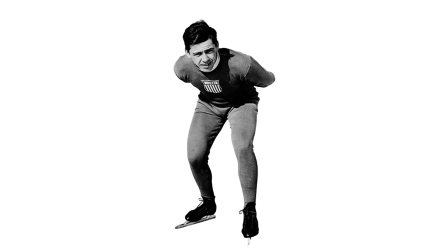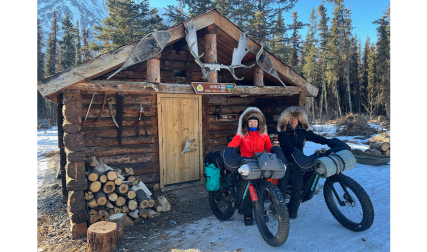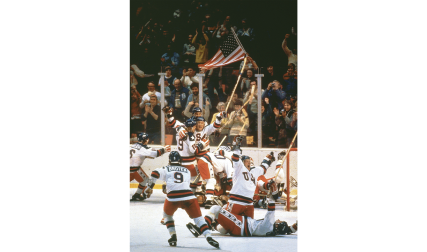Stop the Steal?
I love reading my DAM every month and enjoyed almost every word in “A Wild Idea: How Conservationist Ali Fox ’02 is Making the Great Plains Great Again” [November/December 2022]. However, why use a despised “Trumpism” slogan on the cover when the Great Plains have always been great, majestic, and magical? Please try to avoid repeating any Trumpisms in describing your stories. Like him, his words are toxic, and I’d rather not be reminded of that toxicity while reading about all the awesome things our alumni do in the world.
Nicki Demakis ’86
Mattapoisett, Massachusetts
More Athletes
The “100 Greatest Athletes” [September/October 2022] proved to be an impossible undertaking. Many worthy alums were snubbed, as so many responders have noted. Eddie Jeremiah ’30 is in the U.S. Hockey Hall of Fame. Jim Chasey ’71 and Willie Bogan ’71 were football icons and played on Ivy League championship teams prior to turning pro. Ken “Chico” Davidson ’71 was a leading scorer for the hockey team every season he played. Peter Proulx ’73 was the goalie who backstopped the Dartmouth Indians and earned MVP status at the Great Lakes Invitational tourney in Detroit and the Boston Garden Tournament in 1972. Tom Fleming ’76 was a three-sport star—track, football, and, yes, hockey.
And who can forget the fastball of Pete Broberg ’72, busting catchers’ gloves and opponents’ spirits on the diamond? Later I witnessed him pitch for the Brewers, about the same time that Chuck Seelbach ’70 was saving parts of three games as the Detroit Tigers won the World Series. In reality, there have been a great many more than 100 greatest athletes at Dartmouth College.
William Berry ’73
Milwaukee, Wisconsin
It was a fascinating article and list. I was struck by the absence of Susan Dunklee ’08. Given her extraordinary rankings in world competitions and at how many Olympics, I find it hard to believe that she is not listed among Dartmouth’s recent greats.
Marianne H. Hraibi, Adv’08
Saint Johnsbury, Vermont
If l had a vote, it would be for my father, Joseph C. Sullivan ’49, winner of the George H. “Bulger” Lowe Award as New England’s top football player in 1948. He held Dartmouth records for running back, career average yards per carry (6.7 yards), and career interceptions and yardage of 11 thefts for 112 yards. The 44th player chosen in the NFL draft, he turned down a contract from the Detroit Lions to coach at Georgetown for two years, culminating in a trip to the Sun Bowl. He returned to Hanover to coach at Dartmouth as well. His career is unrivaled by anyone on the list.
Joseph M. Sullivan ’78
Brighton, Massachusetts
The article about Dartmouth’s “100 Greatest Athletes” was excellent. However, the future may not reflect the past. Based on administrative decisions during the past decade, including the proposed and failed (at that time) determination to eliminate five varsity sports, one could easily presume that the significance of most athletics at Dartmouth is on a long-term decline.
Any intentional reduction in athletes and athletic teams or in athletic recruits would be in direct conflict with that article, which clearly spells out or implies many of the advantages of Dartmouth athletics. Dartmouth athletes often become goodwill ambassadors of the College.
The article states, “Sports have always been part of the Dartmouth zeitgeist.” That tradition should be continued and possibly even enhanced; it should not be reduced. In an article by President Phil Hanlon’77 in the November/December 2018 issue of DAM, he expressed those same feelings when he said, “Athletics are among the purest forms of experiential learning,” and then explained why in intricate detail. Which path will Dartmouth take?
Victor S. Rich ’61
Manhasset, New York
I know your article on athletes will stimulate many letters such as this. But David Thielscher ’54 earned three letters in football, three letters in hockey, and two letters in lacrosse, and he played one year of club rugby as a freshman (not eligible for varsity at that time).
Thomas Scott ’54
Huntington, West Virginia
I couldn’t agree more with the letter from Peter Rogol ’70, DMS’78, regarding those athletes left out. Here’s a quick vignette about one of that group, Mickey Beard ’67, who was the toughest competitor I have ever known. We were taking infield before a game with Harvard. Our third baseman, Paul Mikus ’67, had missed a grounder or two, and the Harvard bench was getting on him from the dugout just a few feet off the third-base line.
Beard called in to Dartmouth coach Tony Lupien, who was hitting ground balls in the pregame warmup, to hit the next ball to him at shortstop and then pointed to Paul to cover third base to ostensibly take the throw. Mickey fielded the grounder and—he had a gun for an arm—threw the ball as hard as he could directly into the Harvard dugout. From that point on the silence from the Crimson players was, as the saying goes, deafening.
John Lallis ’69
Gladstone, New Jersey
Thanks for a fun and interesting issue on Dartmouth’s 100 greatest athletes. I would suggest you missed one: Eric Evans ’72, Adv’96, one of the best whitewater kayakers the United States has ever produced. Son of Jay Evans ’49, the 1972 U.S. Olympic whitewater team coach, Eric was the top American competitor in the K-1 (single-person kayak) class at those Olympics, placing seventh. Among his many competitive achievements, he was a nine-time national champion (1969 and 1971-1978). He co-authored Whitewater Racing: A Comprehensive Guide to Whitewater Slalom and Wildwater Racing in Canoes and Kayaks and wrote many articles about the sport for various publications over many years.
He was competitive on the world stage in a sport dominated at the time by Europeans, while virtually unbeatable at home. He deserves recognition for his world-class excellence.
JOHN BURTON ’69
Flat Rock, North Carolina
Dartmouth can’t close the chapter on the College’s “100 Greatest Athletes” [September/October 2022] without including Bill McCall ’32. Bill was the star of the “Greatest Football Game ever played in the Yale Bowl,” on October 31, 1931. While the game ended in a 33-33 tie, McCall scored three touchdowns and gained 243 yards in just three of his many carries. He returned a kickoff for 93 yards, scored on a 25-yard pass interception, and caught a pass for his third touchdown. That year he was the team’s leading scorer, with 15 touchdowns.
The clock ran out for Yale on Dartmouth’s 18-yard line that October. But never for Bill McCall. After the football season was over, he quickly changed his cleats for his basketball shoes: He was the captain of the Big Green and their leading scorer. Bill McCall is one of Dartmouth’s “100 Greatest.”
MICHAEL WALLACE
Pentwater, Michigan
I greatly enjoyed reading the recent article in which a panel selected Dartmouth’s 100 most outstanding athletes. All of those on the list were undoubtedly great athletes. But when I think of the all-time great Dartmouth athletes when I was growing up in Hanover in the 1940s and 1950s, the following immediately come to mind: John Clayton ’51, a great quarterback, and Bill Roberts ’51, who set the season rushing record (and used to let me carry his helmet into the Davis Field House after a game when I was a kid). Jake Crouthamel ’60, who broke Bill’s record. In addition to Bill Riley ’46, who is on the list, his brothers Jack Riley ’44 and Joe Riley ’49, who, with Bill, were probably Dartmouth’s greatest hockey players in coach Eddie Jeremiah’s era.
And, of course, Brooks Dodge ’51 and Bill Beck ’53, who were on the U.S. Alpine ski teams in both the 1952 and 1956 Olympics.
No doubt many others deserve mention as well. But all of them would no doubt say, the most important thing is for Dartmouth to continue to attract great athletes in all of its sports in the future.
DAVID R. CAMERON, Tu’66
Madison, Connecticut
I so much enjoyed “Dartmouth’s 100 Greatest Athletes” and the letters recalling others in the November/December issue. These have inspired me to recall Gerald “Jerry” Ashworth ’63, an amazing Dartmouth athlete who was among those described online. Jerry won a gold medal at the 1964 Olympic Games, running the second leg of the United States’ 4x100-meter relay team with Paul Drayton, Dick Stebbins, and Bob Hayes. The victory set a new world record for the event—39.0 seconds. Jerry also won a gold medal in the 4x100 in the 1965 Maccabiah Games. In 1961, Ashworth’s 6.1-second mark tied the world record in the 60-yard dash. He set the Ivy League and New England record for 100 yards—9.4 seconds in 1962—and matched it again in 1964.
I remember Jerry vividly as I ran against him in the 100-yard dash in fall 1960 trying out for the Dartmouth track team. I was never before or after so solidly or gracefully thrashed in an athletic contest.
LOUIS W. GOODMAN ’64
Bethesda, Maryland
I have to take issue with the choices of the “100 Greatest Athletes” on several levels. The time span seemed to go back about 100 years. Dartmouth has had the privilege to have enjoyed so many great athletes that the number “100” seems very pat and rather meaningless. You might have looked at each decade along the way and made your picks in that mode. Of course, you’d have more than 100 stunning individuals.
Alongside the individuals, possibly some extraordinary teams and clubs could have been showcased. For example: The Dartmouth football team of 1970 wound up ranked 14th in the nation—even over Penn State (Joe Paterno was beside himself and wanted a playoff). While your committee did include my classmate, Willie Bogan, others should have been recognized as well. This issue looks back without a deep dive into the history. There has been much grumbling in my class about this omission.
The idea “Why don’t we do a piece on 100 athletes?” was not well thought out.
WAYNE P. HOBIN M.D. ’71
Salem, South Carolina
That Other Guy
While I have the experience of disagreeing with plenty of letters, frequently from older alumni, I respect that they very often lay out some rationale behind their stance. Unfortunately, Lisa Kircher ’07 does nothing of the sort and instead resorts to name calling [“Temporary Insanity,” November/December 2022] in response to the letter from Kristin Young Christman ’90 [“A Putin Fan,” July/August 2022]. Christman’s letter draws out important historical context. I felt the headline was unnecessarily provocative and misconstrued the premise of her letter. Christman called Putin’s 2007 speech “admirable” and noted “many Americans would agree with Putin’s ideas,” specifically “hope for nuclear and conventional arms reductions, disgust with the U.S. hyper-use of force,” and that a “unipolar world with one hegemonic master [is] dangerous.”
Philip S. Augur ’95
Durham, Connecticut
Correction
Our interview with athletic director Mike Harrity (“Look Who’s Talking,” November/December 2022) misidentified his wife’s profession. She is a counseling and sport psychologist.



